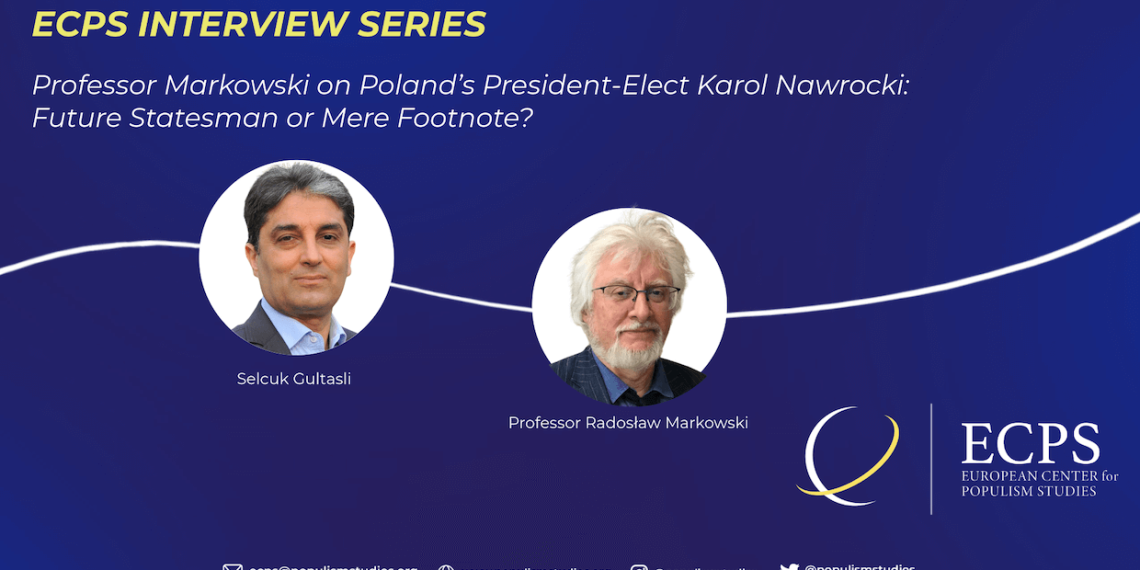In this compelling post-election interview, Professor Radosław Markowski offers a candid, expert analysis of Poland’s newly elected president, Karol Nawrocki. Backed by PiS and inspired by Trump-style politics, Nawrocki’s narrow win poses serious challenges to Prime Minister Tusk’s pro-European government. Professor Markowski dissects the roots of this upset—calling it the result of a “fantastically prepared campaign”—and warns of potential institutional gridlock and democratic backsliding. While describing Nawrocki as “inexperienced” and lacking policy depth, Professor Markowski holds out a sliver of hope that he may rise above partisan loyalties. With sharp insights into Polish society, EU disillusionment, and the dangers of populist overreach, this interview is essential reading on Poland’s increasingly polarized and uncertain political trajectory.
Interview by Selcuk Gultasli
In the aftermath of Poland’s 2025 presidential election, the political landscape remains fraught with uncertainty, ideological tension, and institutional fragility. Karol Nawrocki, a nationalist conservative backed by PiS and inspired by Trump-style politics, narrowly secured victory with 50.89% of the vote, defeating centrist candidate Rafal Trzaskowski. His win delivers a major setback to Prime Minister Donald Tusk’s pro-European government, which has been striving to reverse judicial reforms enacted under the previous PiS administration. With presidential veto power at his disposal, Nawrocki is expected to obstruct key liberal policies, deepening political gridlock and intensifying concerns about democratic backsliding.
In this timely and probing interview, renowned political scientist Professor Radosław Markowski offers a sharp analysis of Nawrocki’s narrow win, calling it the product of a “fantastically prepared campaign” rather than a sign of a lasting ideological shift. Professor Markowski emphasizes that Nawrocki is “definitely inexperienced,” lacking basic knowledge of international relations and economics. Yet despite these limitations, he entertains a faint hope—perhaps naively—that Nawrocki might rise above his campaign alliances and “act reasonably and become a good politician serving the country and society he represents.”
This cautious optimism is tempered by structural concerns about Poland’s democratic integrity. Professor Markowski draws a direct line between the present moment and the legacy of what he has termed “free but unfair” elections. Referencing his article in West European Politics, he highlights the disproportionality of PiS’s 2015 win—where only 18.8% of eligible voters delivered a 51% parliamentary majority—and the subsequent “eight years of structural lawlessness.” Nawrocki’s victory, Professor Markowski argues, does not signal a visionary mandate, but reflects the effective demobilization of liberal voters and the disciplined overperformance of a conservative-nationalist base.
With his strong nationalist rhetoric and pledges to limit EU influence while promoting Polish sovereignty, Nawrocki’s rise has been cheered by Eurosceptic leaders across Central Europe, including Viktor Orbán and Marine Le Pen. Yet his alignment with this populist-right alliance only heightens fears of further democratic erosion in a country once considered a model of post-communist European integration.
Whether Nawrocki becomes a transformative statesman or a forgettable footnote in Polish political history remains an open question. As Professor Markowski underscores, the new president now faces a choice: to entrench polarization and gridlock, or to rise above partisan constraints and define his legacy in the eyes of future generations.


